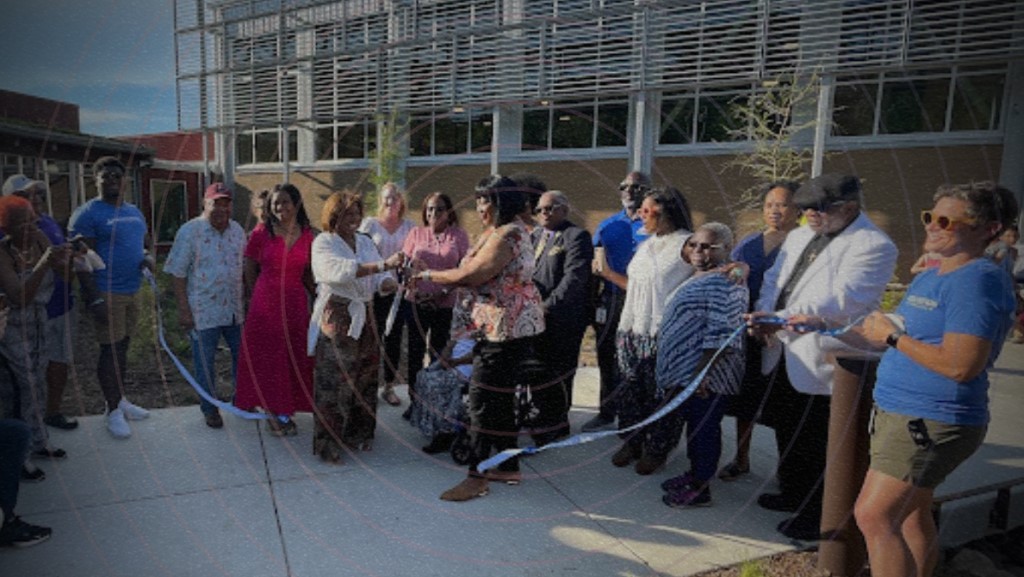Source: WLOS
It’s been a long time coming for Southside, a historic Black neighborhood in Asheville, North Carolina.
At the beginning of August, the Southside neighborhood celebrated the expansion of the Dr. Wesley Grant Sr. Southside Community Center. Over a year ago, city leaders and residents broke ground for this $8.3 million project that added many indoor and outdoor amenities to the facility. These amenities included a multi-purpose gym, several new community meeting rooms, an outdoor basketball court, a rain garden, and a neighborhood swimming pool.
In an interview with ABC 13, Black Asheville resident Nesiya Fann shared her excitement about the newly improved community center and said “I hope it brings the community back alive like it used to be.”
Many descendants of the Southside neighborhood and Black residents of Asheville feel like Nesiya. They are hoping the expansion of the community center will bring back life to a neighborhood that was torn apart by urban renewal in the 1960s and ‘70s.
Prior to the 1960s, the Southside neighborhood of Asheville was a bustling Black economic center in the East Riverside community. Before urban renewal, Southside was home to about 50% of Asheville’s Black population. In this flourishing Black community, there once were 1,100 homes, six beauty parlors, five barber shops, five filling stations, fourteen grocery stores, three laundromats, eight apartment houses, seven churches, three shoe shops, two cabinet shops, two auto body shops, one hotel, five funeral homes, one hospital and three doctor’s offices.
So, why was this Black economic center destroyed in Asheville?
Since Southside (like many Black neighborhoods at the time) had not received the same level of city investment in infrastructure (water, sewer, paved roads) and Black residents were denied access to financing due to redlining, the Southside community did not stand a chance against urban renewal.
What is urban renewal?
Urban renewal was a program initiated by the federal government with the sole purpose to improve and revitalize the landscape of American cities. Through the passing of the Housing Acts of 1949 and 1954, the federal government gave American cities the opportunity to redevelop areas that were deemed “blighted” and badly needed to be renovated. These “blighted” areas were often poor and working-class neighborhoods that were occupied by predominantly Black residents.
Thanks to federal grants, local governments and housing authorities were able to buy rundown homes and businesses in these “blighted” areas. After acquiring these properties, local governments would either sell the properties to developers, tear down buildings to make way for new development and roads, or hold onto the property until a later date. Whereas housing authorities tore down single-family homes and apartments to build housing projects.
In Asheville, there were six urban renewal projects throughout the city. The East Riverside Urban Renewal project was the largest in the Southeast, which is the area where the Southside neighborhood is located.
Due to urban renewal, the Southside neighborhood was decimated and its Black residents were displaced. The Southside neighborhood has not been the same since. This is why the expansion of the Dr. Wesley Grant Sr. Southside Community Center is so significant because it creates hope for a new beginning for the Southside community.
–
It is difficult to learn about the injustices of our past especially those done to Black communities, however, the only way we move forward together is by learning from our past.
If you would like to know more about Southside and its history of urban renewal, visit these sites: https://urbanrenewalimpact.org/, Urban Renewal & City Owned Property (arcgis.com), or East Riverside Urban Renewal Project (arcgis.com).
If you want to give back to the Southside community, consider donating to the Southside Community Farm. This organization is striving to provide fresh food to those in their community and hosts a monthly Black Indigenous People of Color (BIPOC) farmers market to promote local craftspeople and farmers of color.
Remember, in order for us to create a brighter future for our children, we must learn from our past.





